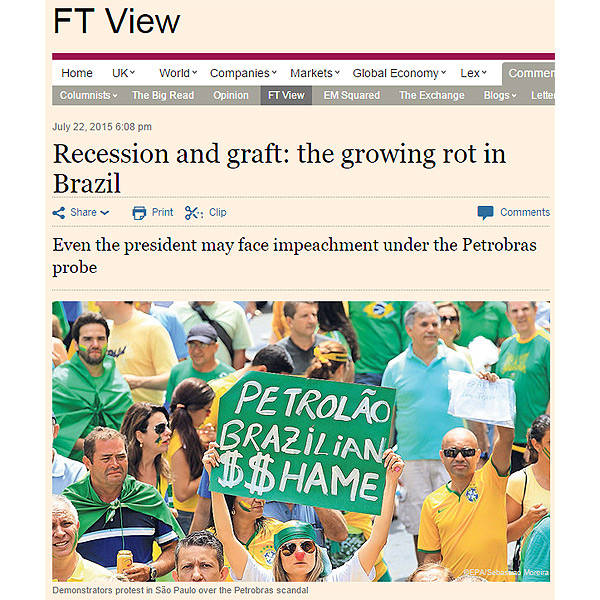Latest Photo Galleries
Brazilian Markets
15h15 Bovespa |
-0,16% | 124.533 |
16h43 Gold |
0,00% | 117 |
15h36 Dollar |
+0,30% | 5,1645 |
16h30 Euro |
+0,49% | 2,65250 |
ADVERTISING
Political Unpredictability Affects Brazil's Image Abroad
08/24/2015 - 09h49
Advertising
FROM SÃO PAULO
South American neighbors are apprehensive about the risk of political changes; Europeans are monitoring the worsening economic situation; emerging countries are concerned about joint projects; North Americans don´t understand.
The whirlpool in which Brazil has plunged into in the last months draws different degrees of attention around the world, although there are no serious fears for now.
The level of concern varies according to the ties to Brazil.
If Buenos Aires and Caracas come out in defense of Rousseff, in Europe a calculated observation prevails, and in the US there's a lack of knowledge.
In common, there is the emphasis, by governments, analysts and the foreign media, on corruption investigations in the country and the diagnosis that the scenario is surmountable.
SOUTH AMERICA
In Venezuela, the most apprehensive of all, Nicolás Maduro administration fears to lose the support of the most powerful country in the region if Dilma Rousseff is impeached.
In Argentina, the concern is about the effect of the political paralysis in the economy, and how it affects production and employment in the country.
Caracas disseminates the idea that Rousseff is the target of a campaign allegedly sponsored by the US to replace leftist presidents in the region by conservatives.
"There are coup threats in Brazil in the coming months", Maduro said on TV. "If they dare to meddle with Brazil, what will happen to the rest?", the president asked, and also led a Twitter campaign with hashtags like #LulaDilmaSomosTodos (WeAreAllLulaDilma).
Argentina's Cristina Kirchner follows the same line: there is a conspiracy in South America to destabilize "popular and democratic" governments. "By all means, they tried to prevent Dilma from being re-elected", she said in her national address last Thursday (20).
EUROPE
On the mainland, the predominant focus is on the economy. At the first tier of the leading European governments, the political scene in Brazil hasn´t achieved yet a high level of concern.
The volatility of the crisis thermometer contributes to this: for those who are far, Rousseff seems on the verge of falling in a week; to others, she is a little stronger.
For now, no European leader has said anything about the Brazilian situation. Sought by Folha, the British government, for example, didn´t comment on it.
During her brief visit to Brasília this week, German Chancellor Angela Merkel hasn´t spoken publicly about the political instability in the country. However, her presence, with 12 ministers and deputy ministers, was used by the Brazilian government as a demonstration of the German confidence.
USA
The political crisis in Brazil has no negative impact on the relations with Washington nor delays the bilateral cooperation.
This is the official discourse in both countries, which emphasize a turn of the page formalized with Dilma Rousseff´s visit to the country in June, after the crisis caused by the scandal of the Americans spying the Brazilian president, which made her cancel the previous visit in 2013.
However, behind the normalization, the ignorance on what happens in Brazil is what characterizes the American vision. Experts from studies centres and officials from the State Department have difficulty to understand the crisis in the country and, in many cases, a lack of concern prevails.
With American diplomacy concentrated on issues that are considered to be crucial to President Barack Obama legacy, as the rapprochement with Cuba and the nuclear deal with Iran, there is little attention left to countries like Brazil.
In the country, the general ignorance about Brazil is undeniable, often even among those who should, given their professions, follow what is happening, as American diplomats and the so-called "Latin America experts".
Translated by DENISE MOTA




